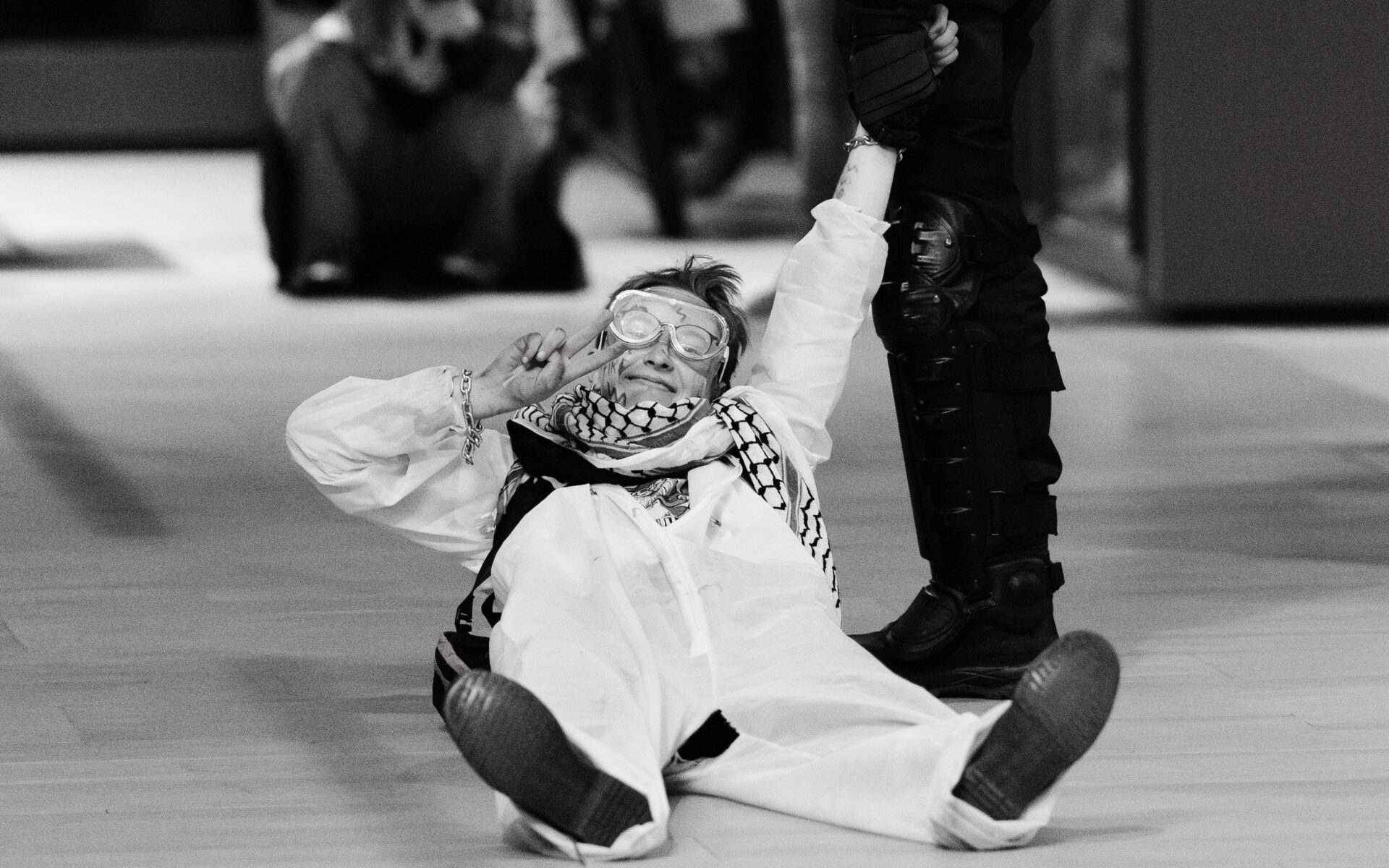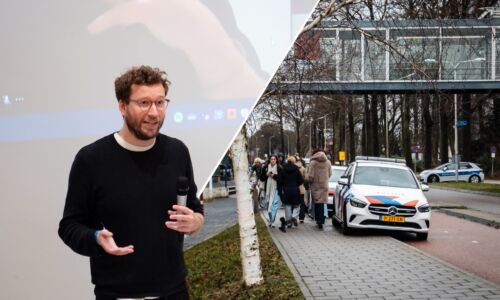Protesting in full view of TikTok: ‘Social media are primarily used as a means of mobilisation’
-
 Illustratie: Debby Peeters
Illustratie: Debby Peeters
Students going so far as to spend the night in a tent on campus because they want to change the world: how committed can you get? With their occupations of university buildings, motorway blockades, and climate marches, young people today are showing themselves to be more activist than ever. But let us not forget that their protests are also much more visible.
Rutger van den Berg would certainly not say that the Gen Z youth are more activist than previous generations. ‘Every scientific study shows that differences within one and the same generation are greater than differences between generations,’ says the researcher from Youngworks, a consultancy agency specialising in the youth. ‘This is also true of themes like idealism and the need to be on the barricades.’
What is true, as Van den Berg explains, is that young people have always been idealistic. They view the world with fresh eyes, and think about what could be better. Overall, they have a positive outlook on their own future. Even with sky-high student debt, a housing crisis, climate change, and the many wars going on in the world.
‘Because everything is still open, they feel they can still steer the world. Perhaps that is why, among young people, there are always protest movements that attempt to steer the world in a certain direction. Think of the student protests in the 1960s and 1970s.’
Renegade youth
The activism of the youth may not be so exceptional, but the visibility of modern-day protests is, says Van den Berg. According to the researcher, in order to understand this, we need to go back 70 years. Until the 1950s, all young people had to do was work. In the mid-1960s, space first emerged for young people to organise their own lives the way they wanted, in what was known as the counterculture.
‘In their appearance, ideas, and actions, they set themselves apart from they way society was organised. This was not well received by the society in question: young people were throwing their lives away, where did this renegade youth get their ideas from?’
As the former beatniks became parents, this critical view of young people gradually subsided. ‘That created more acceptance for youthful idealism. After a while, it even turned into glorification: the sentiment that it is attractive to remain young in lifestyle. This has funny side effects: think of older people dressing like young people, which is often a strange sight.’
That shift, says Van den Berg, went hand in hand with the rise of capitalism. ‘As a result, progress thinking also became central to society. Being young suddenly equalled the power to change things, of not standing still. All in all, this led to more attention to young people, making them more visible. And this also applies to youth protests.’
‘Youth political parties often being more outspoken in their views than their adult sister parties’
A characteristic of young people, says the researcher, is that they are trying to come to grips with the world around them. Shaping their world is a process of experimentation that often involves exploring extremes. He gives the example of youth political parties often being more outspoken in their views than their adult sister parties. For example, in 2020, anti-Jewish and pro-Nazi posts were leaked by young people from Forum voor Democratie. A year later, the SP decided to again break with its youth branch when several members turned out to be affiliated to the Communist Platform.
Extinction Rebellion
You can also see these traits in other contemporary protest movements, says Van den Berg. Younger people tend to be more outspoken on topics such as gender fluidity or climate change. Consider the climate activists of Extinction Rebellion, who want an end to fossil subsidies and regularly block the A12 in The Hague. According to Van den Berg, the recent pro-Palestine protests also fit into these attempts by the youth to get a grip on the world surrounding them, and making themselves heard out of engagement. ‘These actions are now attracting far more attention because we are socially more focused on young people than we were 50 years ago.’
Social media also act as a magnifying glass, and create more visibility. ‘They are primarily used as a means of mobilisation. Consider the 2010 Twitter revolution in Iran, which galvanised many protesters. Today, climate activists and pro-Palestine protesters use Telegram, TikTok, Instagram, and other channels. This allows them to generate a lot of attention.’

Another factor, according to Van den Berg, is that young people are more articulate than they used to be, partly due to their upbringing. ‘Developmental psychology speaks of a shift from a command household to a negotiation household. Children are increasingly given a voice in family decisions, for example on how they spend their evenings, or the family’s next holiday destination. This does not mean that children get to decide everything, but if parents make a decision that children do not like, this is open to discussion. Of course, this is not true of all families – society is more diverse than it used to be – but on average, we can see a shift.’
‘Young people speak up when they disagree with something’
This growing emancipation of young people can also be seen in education and at work, according to the researcher. ‘Young people speak up when they disagree with something. If this is not taken into account, it leads to friction. Even in secondary school, young people learn to stand up for their beliefs, set boundaries, and shape their life in an assertive way. They get used to a more equal position, and are trained to be in such a position. That may help explain why this generation is so visible around social issues.’
Hesitant do-gooders
What is the level of engagement among Nijmegen youth? For Radboud University, Van den Berg conducted research on the world-improving aspirations of 1,600 students. The study shows that 86% of Nijmegen students want to make a sustainable social contribution later on as professionals, although the way students envisage this varies quite a bit. ‘Young people can now choose from a wider range of themes, and this makes them more engaged.’
Within Radboud University’s engaged young people, several types can be distinguished, according to YoungWorks’ research. The opinionated advocates (12%) are students who feel personally involved in societal challenges and want to make positive changes in the world, for themselves and their like-minded peers. ‘This group is very vocal, also on issues such as climate change and gender equality. Odds are high that the organisers of the recent pro-Palestine demonstrations on campus belong to this group.’
‘Hesitant do-gooders are still in the process of committing to certain ideas’
But by no means all Nijmegen students engage in demonstrations, as apparent from Van den Berg’s research. A larger group than the opinionated advocates are the self-centred optimists (20%), a group that is very positive about the future, and is most interested in creating a comfortable life for themselves and the people close to them.
The third group, which is even larger, consists of what Van den Berg calls the hesitant do-gooders (35%). ‘They are still in the process of committing to certain ideas, values and beliefs, and trying to align their behaviour with them. They are in principle also ready to make a positive change, but they are not yet sure in what area.’




